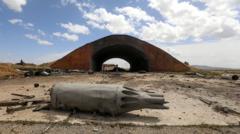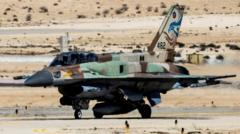In a pivotal moment for post-war Syria, the nation's Easter celebrations unfold peacefully, but concerns linger among religious minorities over the commitment to inclusivity by the new governing body.
Easter in a New Syria: A Test for the Governement's Inclusivity

Easter in a New Syria: A Test for the Governement's Inclusivity
Syria marks Easter with cautious optimism as new leadership takes the helm.
In Damascus, Easter festivities resonated with a sense of cautious celebration, as Christian communities gathered for worship at the notable Al Zeitoun Cathedral. The newly instituted government, headed by Ahmed al-Shara, a former member of Al Qaeda who claims to have moderated his views, now faces the daunting task of demonstrating its dedication to inclusivity during such a historically significant time for Christians.
The Easter celebrations served as an early indicator of the new regime's approach to governance, particularly regarding religious freedoms. With the backdrop of a mere five-month-old political shift following the fall of President Bashar al-Assad's authoritarian rule, questions abound regarding how this emerging leadership will support the diverse religious fabric of the country.
Many Sunni Muslim Syrians have voiced their acceptance of the new conservative Islamic leadership; however, the sentiment among religious minorities remains fraught with anxiety. The Easter holiday, a time of hope and resurrection, was tinged with apprehension from these communities about their future under the new administration.
Image captures of the day depicted worshippers at the Orthodox Armenian Church alongside scenes of vibrancy from young attendees at Al Zeitoun Church, celebrating both faith and the new-found sense of community—albeit shadowed by uncertainty. How the government will continue to navigate this delicate balance of faith and politics remains to be seen, as the new Syria seeks to solidify its identity amidst the echoes of its tumultuous past.




















